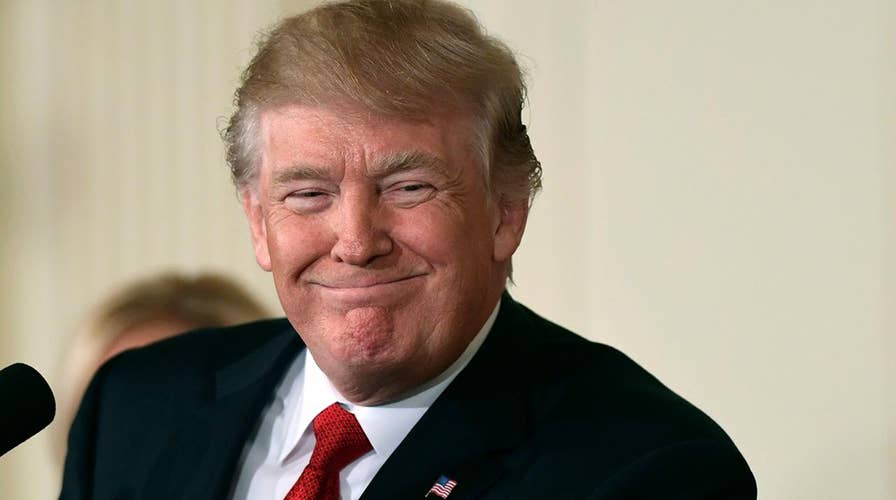For the second time in as many months, Americans are demonstrating a profound ignorance of the First Amendment to the U.S. Constitution. But this time, it’s not about the NFL and freedom of speech; it’s about our sacrosanct freedom of the press.
Backlash followed swiftly Thursday after President Trump’s tweet against mainstream media (specifically, NBC News). The president tweeted: “Network news has become so partisan, distorted and fake that licenses must be challenged and, if appropriate, revoked. Not fair to public!”
Commentators claimed this threatened freedom of the press.
In response to an NBC story claiming that the president called for a bigger U.S. nuclear arsenal, President Trump denied the story as flatly false during a White House meeting with Canadian Prime Minister Justin Trudeau.
If one takes the time to actually read the tweets and understand the First Amendment, you’ll find that claiming President Trump is advocating for government regulation of the press is an absolutely baseless assertion and just another inane overreaction.
President Trump’s denial was bolstered by Defense Secretary James Mattis, who said: “Recent reports that the president called for an increase in the U.S. nuclear arsenal are absolutely false. This kind of erroneous reporting is irresponsible.”
The president also tweeted: “With all of the Fake News coming out of NBC and the Networks, at what point is it appropriate to challenge their License? Bad for country!”
But if one takes the time to actually read the tweets and understand the First Amendment, you’ll find that claiming President Trump is advocating for government regulation of the press is an absolutely baseless assertion and just another inane overreaction.
First, let’s understand what the First Amendment actually says and what it actually does. Contrary to popular belief, our Bill of Rights does not confer rights upon individuals, nor are our rights absolute. The Declaration of Independence acknowledges that our individual, unalienable rights are endowed by our Creator, not our government. The mandate for American government is simply to best preserve and protect our preexisting rights.
Thus, the First Amendment acts as a redundancy safeguard, or a check, against the specific, limited powers given through our U.S. Constitution to government to operate in accordance with that mandate. In other words, just in case our federal government attempts to overreach its specific, limited powers provided in Articles I through III, the Bill of Rights tells Congress precisely what government cannot do.
The First Amendment reads in relevant part: “Congress shall make no law…abridging the freedom of speech, or of the press….” It is important to note here that the operative term is “abridging.” The Supreme Court has rightly acknowledged in Roth v. United States and other similar cases that rights protected by the First Amendment are not absolute.
Freedom of the press generally means that the government cannot interfere with the publication and distribution of information and opinions – not that the government may never impose restrictions.
For example, I cannot publish a story about my neighbor having an affair that I know is false. My neighbor could rightly sue me for damages in that instance. The law provides relief for defamation, including libel and slander.
The Supreme Court has routinely upheld defamation laws and afforded civil liability remedies. In the 1964 case New York Times v. Sullivan, the court held that where individuals and publications disseminated information published with reckless disregard of whether that information was false or not, even public officials could win a lawsuit for libel.
This is still the basic rule for mainstream media outlets like NBC. If NBC published a provably false story with reckless disregard for its truth or falsity, President Trump (like any other public official) can file suit. This legal remedy doesn’t amount to “government regulation” or remotely contravene the First Amendment’s protection of freedom of the press.
Whether or not the Federal Communications Commission would revoke licenses granted to NBC’s local stations based on demonstrably false content may be a lawsuit primed for today’s “fake news” era. And whether or not President Trump would prevail in any such legal action does not support the overreaction to his tweets. The president and Mattis are correct that the media bears responsibility for veracity and truthfulness.
Is it really too much to require that the media are at least accurately reporting facts, even if their constitutionally protected opinions are clearly biased? The law presumes that a reasonable person knows the difference between a reporting of fact versus an opinion. Facts cannot change depending on a reporter’s political agenda.
The president’s tweets and comments are often bombastic and pointed, but thus far he hasn’t actually advocated anything that would amount to an unconstitutional government infringement upon our individual rights that his office (and the entire scope of American government) is mandated to preserve and protect.
If the media are allowed to publish with reckless disregard for the truth in reporting facts, at that point we have lost all credibility and the original purpose for the freedom of press. Journalism is still rightly required in this country to operate with integrity. Yet the media continue to claim, since even before the election, that somehow it’s President Trump who is a threat to the First Amendment.
Publish any opinion you want, mainstream media, but at least do your job and verify your facts first.

